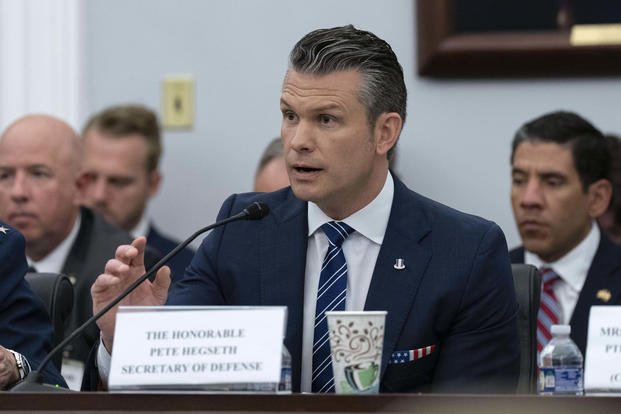Hegseth Won't Say He'd Follow Court Order on LA Troop Deployment

Defense Secretary Pete Hegseth refused to say Thursday whether he would follow a federal district court order if it rules that the Trump administration's troop deployments[1] to Los Angeles are illegal.
"What I can say is that we should not have local judges determining foreign policy or national security policy for the country," Hegseth said in response to a question from Rep. Ro Khanna, D-Calif., during a House Armed Services Committee hearing.
Asked again by Khanna whether he would respect a court decision, Hegseth reiterated that, "What I'm saying is local district judges shouldn't make foreign policy for the United States."
Read Next: Army Officials Pushed Back on Pop-Up MAGA Shop Ahead of Fort Bragg Trump Speech[2]
When pressed later in the hearing by Rep. Sarah Elfreth, D-Md., specifically whether he would follow a Supreme Court ruling, Hegseth said, "We're not here to defy a Supreme Court ruling."
Hegseth's evasiveness on Khanna's questions was part of a pattern of dodging inquiries from Democrats on Thursday.
Among the topics where Hegseth did not provide direct answers: his disclosure of real-time attack plans on the unclassified messaging app Signal; whether he believes women are capable of "lethality," one of his favorite buzzwords; why he and the president have fired several top military officers; and whether it is Pentagon policy to be prepared to invade Greenland and Panama, as President Donald Trump has sometimes floated.
Thursday capped off a week of congressional testimony for Hegseth, who faced pointed questions[3] at each hearing[4] about the Trump administration's decision to deploy the National Guard[5] and Marines to Los Angeles to respond to protests against immigration raids.
Trump ordered about 4,000 National Guardsmen and 700 Marines to protect federal property and immigration officers from the protests, which have been punctuated by some violence but have been largely peaceful and confined to a few blocks in downtown LA.
The deployments were done over the objections of California Gov. Gavin Newsom, who quickly filed a lawsuit alleging Trump illegally usurped state authority.
The Justice Department, in a court filing Wednesday, called Newsom's lawsuit a "crass political stunt." A court hearing on the lawsuit was taking place Thursday afternoon.
The Trump administration has repeatedly violated court orders since taking office in January, particularly on cases related to immigration, one of the top issues he campaigned on.
Trump and other administration officials have sought to differentiate between lower court rulings, which they maintain have run amok and shouldn't dictate nationwide policy, and the Supreme Court, which they have said they would respect.
But the Trump administration has also ignored the Supreme Court.
After the Supreme Court ruled the Trump administration had to "facilitate" the return of a man wrongly deported to El Salvador, administration officials spent months claiming they couldn't bring him back and did not have to. The man was ultimately brought back to the United States last week and charged with transporting undocumented immigrants.
The Pentagon, though, has been following court orders, such as waiting until after the Supreme Court ruled in its favor to enforce the Trump administration's ban on transgender troops.
In response to Hegseth's comments at the hearing Thursday, Newsom posted on social media that "this is not normal."
Related: Marines Authorized to Temporarily Detain Protesters in LA, Raising Legal Concerns[6]
© Copyright 2025 Military.com. All rights reserved. This article may not be republished, rebroadcast, rewritten or otherwise distributed without written permission. To reprint or license this article or any content from Military.com, please submit your request here[7].


